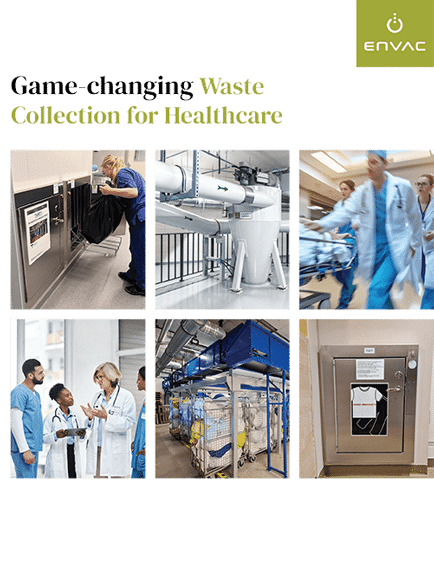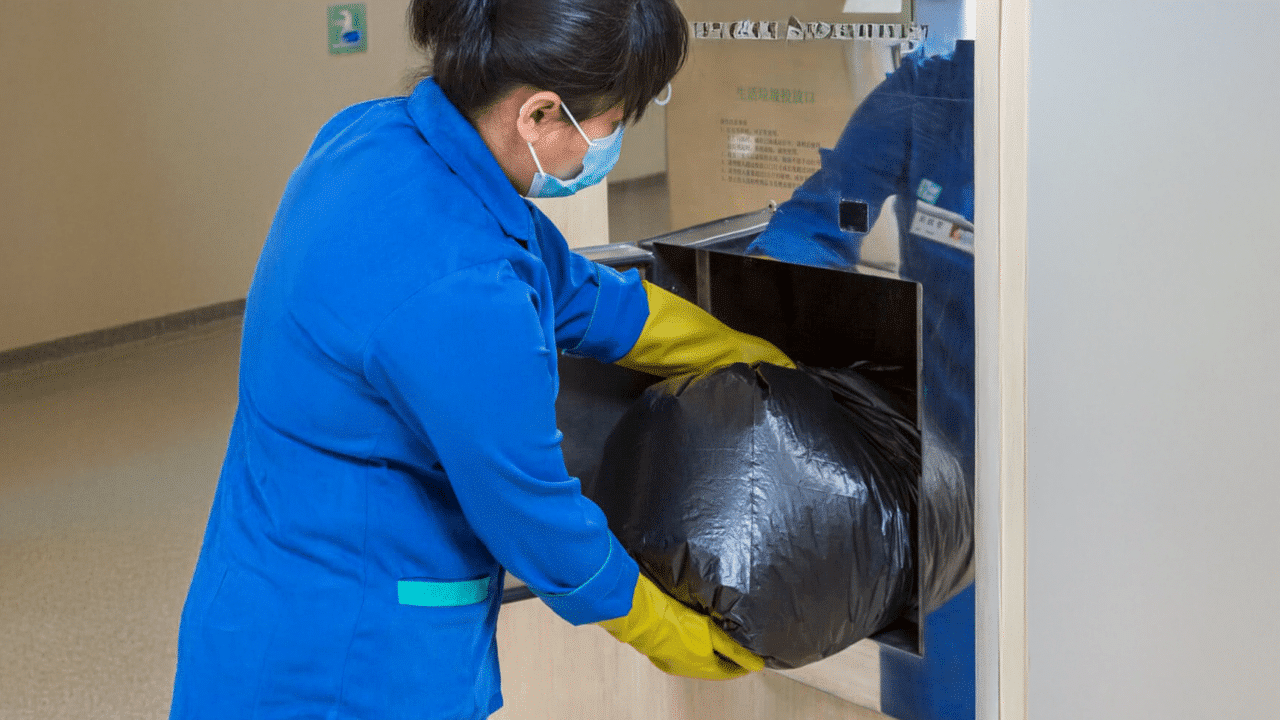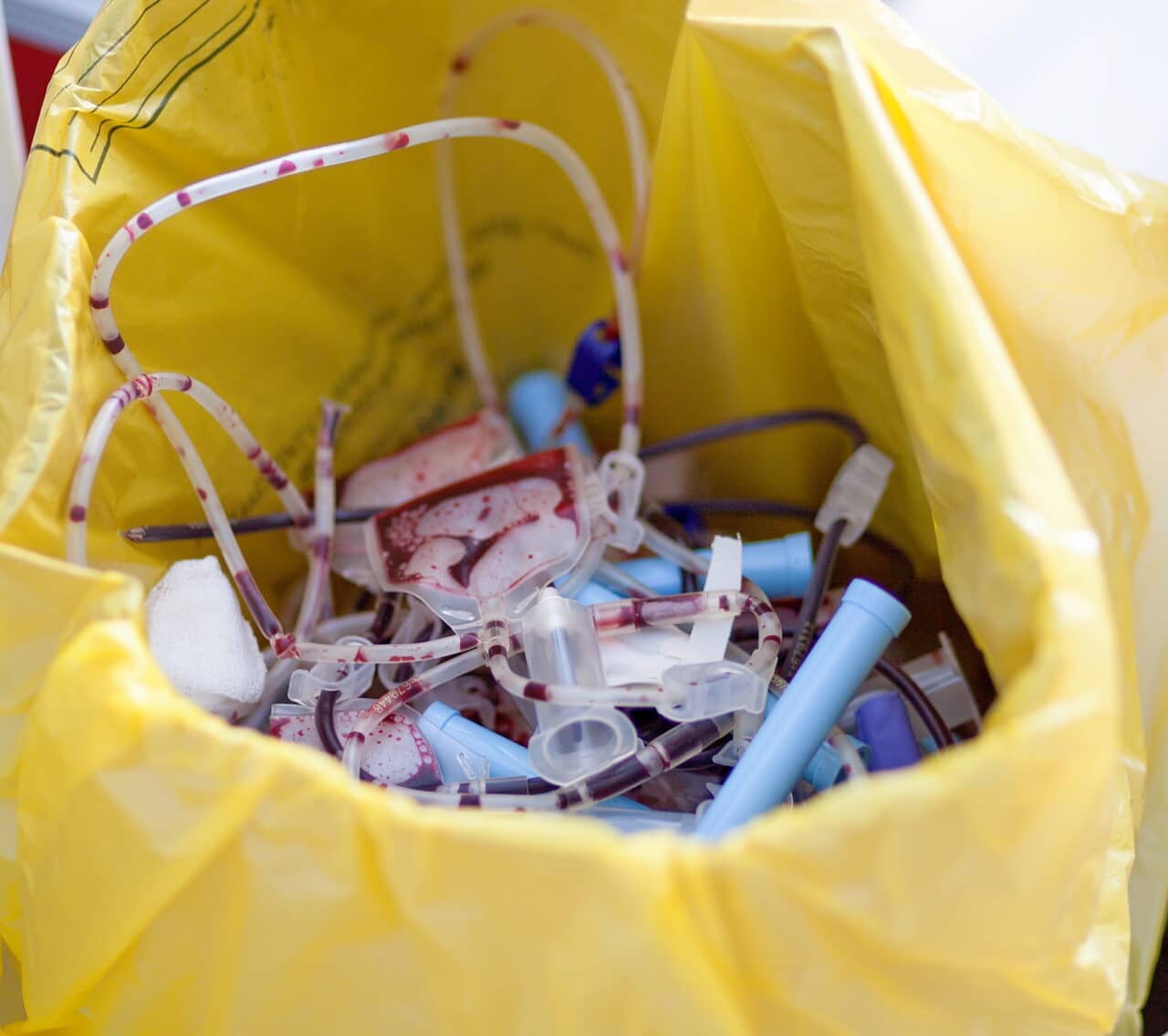Hospitals face unique waste management challenges—limited space, constant activity, and high hygiene demands. Traditionally, waste and soiled linen are stored locally in the wards and transported in corridors and elevators. Patients and healthcare professionals risk exposure to both pathogens and odours.
By using fully automated collection through sealed pipes hidden in walls and ceilings, colony-forming unit (CFU) levels in the healthcare environment are minimised, and risks for cross-contamination are eliminated, helping to prevent and reduce risks of healthcare-associated infections (HAIs).
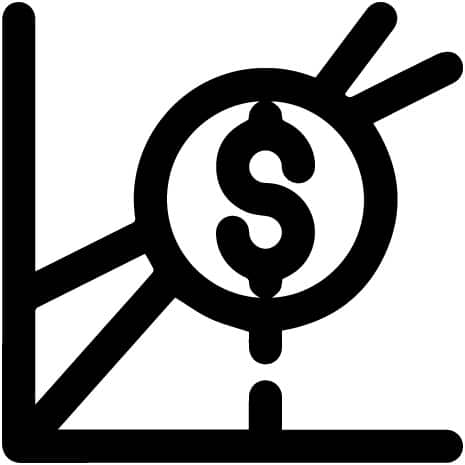
3-6 Years ROI
.
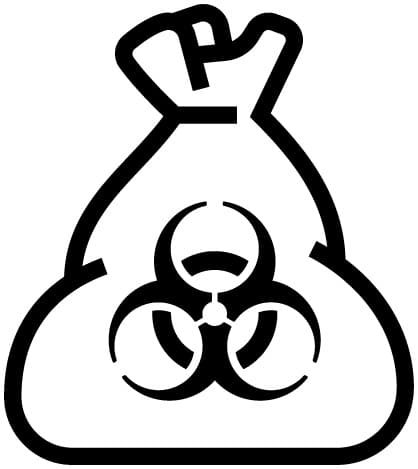
49% lower infection risk

Increased health & safety
5 fractions
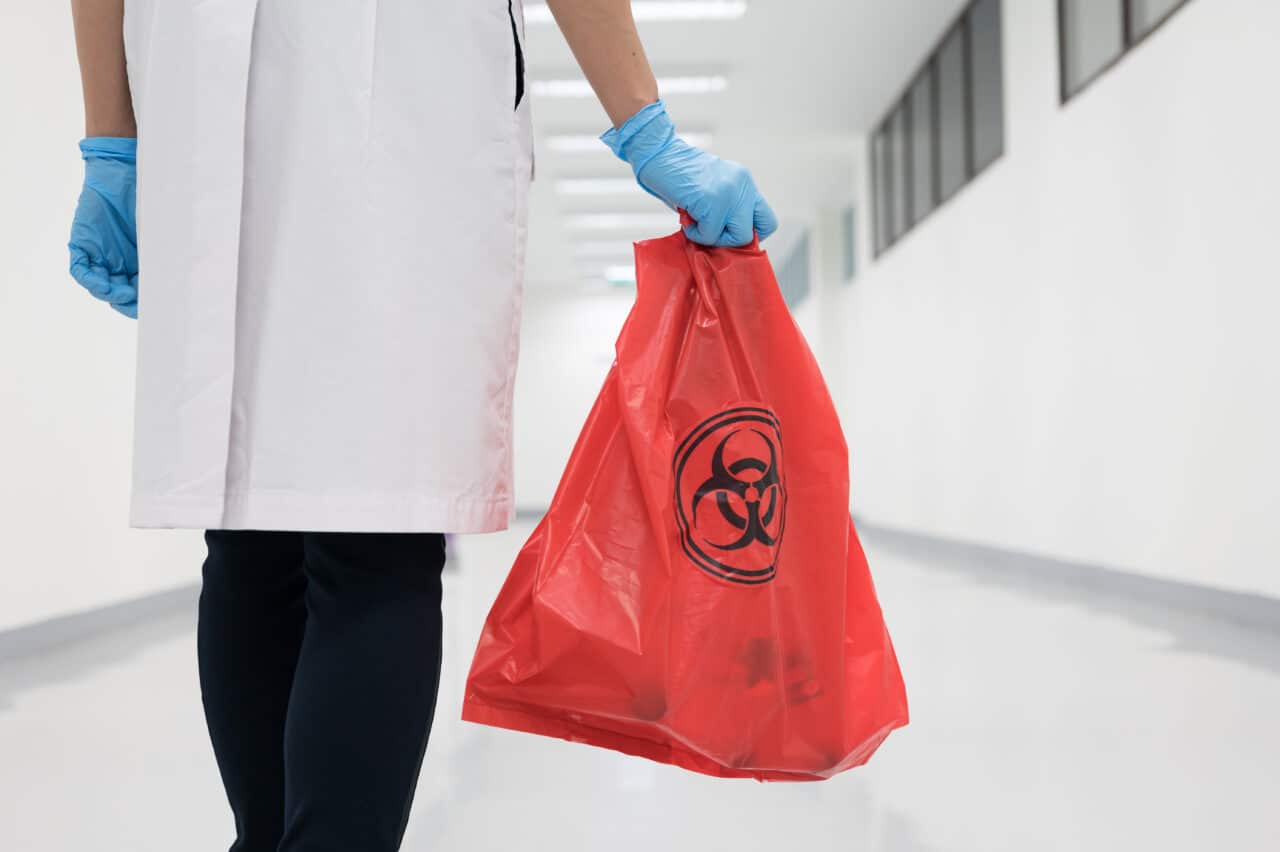
Reducing the spread of infection with infectious waste collection (IWC)
Every year, hospital-acquired infections (HAIs) pose a serious risk to patient safety and cost hospitals millions. Traditional waste handling processes – whether manual or through automated guided vehicles (AGVs) – are still prone to spreading bacteria and contaminating high-traffic areas in a hospital. Automated waste collection and segregation at the source minimise human exposure to hazardous substances. It also prevents odours and potentially disease-carrying nuisances around the waste. The solution minimises the risk of cross-contamination between waste, patients, healthcare staff, and the hospital environment. For example, an Envac system installed in a French hospital transports and separates treatment of type III sharp, infectious waste with on-site sterilisations (scalpels, needles, and any metal/sharp material responsible for transmitting diseases).
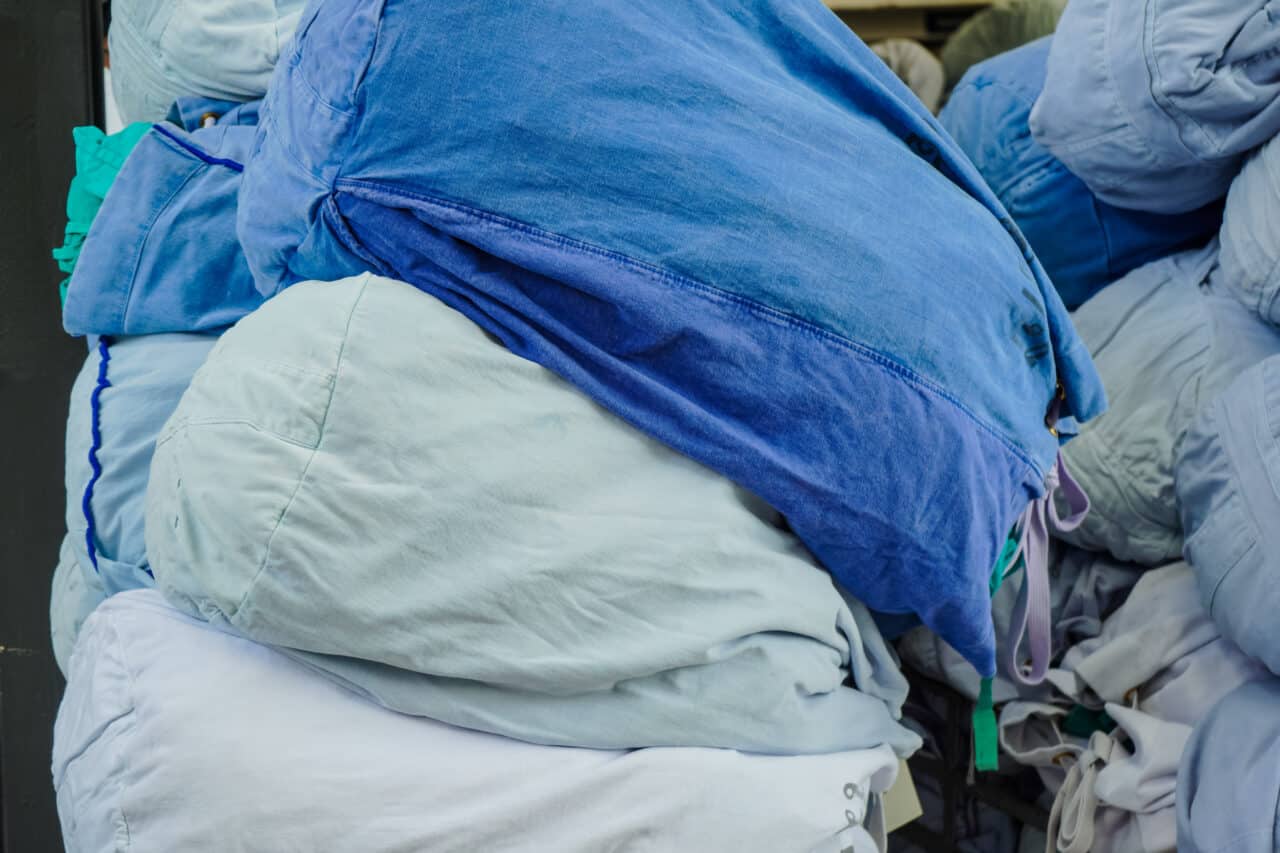
Improving logistics and safety with soiled hospital linen collection
With large volumes of soiled linen and waste generated daily, hospitals must have a reliable system in place to handle collection and disposal swiftly and safely. Envac’s automated linen collection system optimises hospital logistics by reducing manual handling, streamlining waste flow, and ensuring 24/7 hygienic and secure disposal. Hospitals can improve efficiency, free up resources, and create a safer working environment by minimising staff involvement in waste transportation.
A study by KTH University in Sweden found that hospitals using closed pipe systems for soiled linen and waste disposal had significantly lower bacterial contamination levels than those relying on traditional handling methods. The findings revealed that hospitals equipped with the Envac system recorded a 49.3% lower average CFU* count and a 6.10% lower median CFU* count, demonstrating a marked reduction in microbial presence.
By automating linen collection, hospitals can streamline operations, improve infection control, and maintain a cleaner, safer environment for both staff and patients.
(*CFU: Colony-Forming Units, a measure of bacterial presence.)

Strengthening hospital reputation and ensuring regulatory compliance
Hospitals must adhere to strict infection control and hygiene regulations set by bodies such as the NHS, WHO, and local health authorities. Traditional waste handling methods increase the risk of contamination due to manual contact. Envac’s automated system reduces human involvement, minimising infection risks and ensuring safer waste disposal. A closed pipe system prevents airborne contamination, improves waste segregation, and supports regulatory compliance. Beyond compliance, a well-maintained and hygienic environment enhances public trust, reassures patients, and fosters a positive reputation. By eliminating visible waste accumulation, reducing odours, and creating a cleaner facility, hospitals can improve patient satisfaction and staff working conditions. Many hospitals are required to adopt eco-friendly waste management practices to minimise their environmental impact. Envac’s system reduces carbon emissions by replacing frequent manual waste transport with an automated collection system, cutting down vehicle movements and energy use.

Reducing costs and maximising ROI with automated waste management
Investing in Envac’s automated waste collection system delivers long-term cost savings and operational efficiency for hospitals. The system lowers labour costs by reducing manual handling, allowing staff to focus on patient care rather than waste transport. With fewer waste-related vehicle movements, hospitals also save on fuel, maintenance, and staffing expenses. A study by KTH University in Sweden found that hospitals using Envac’s closed system had significantly lower bacterial Contamination, reducing infection risks. This helps hospitals avoid costs associated with infection outbreaks, such as additional cleaning, sterilisation, and compliance measures.
Hospitals typically recoup their investment within a few years (approx. 3 to 6 years) through operational savings, improved infection control, and reduced waste management expenses. By integrating Envac’s system, healthcare facilities create a cleaner, safer, and more cost-effective environment, ensuring long-term financial and environmental sustainability.
Discover the advantages of Envac
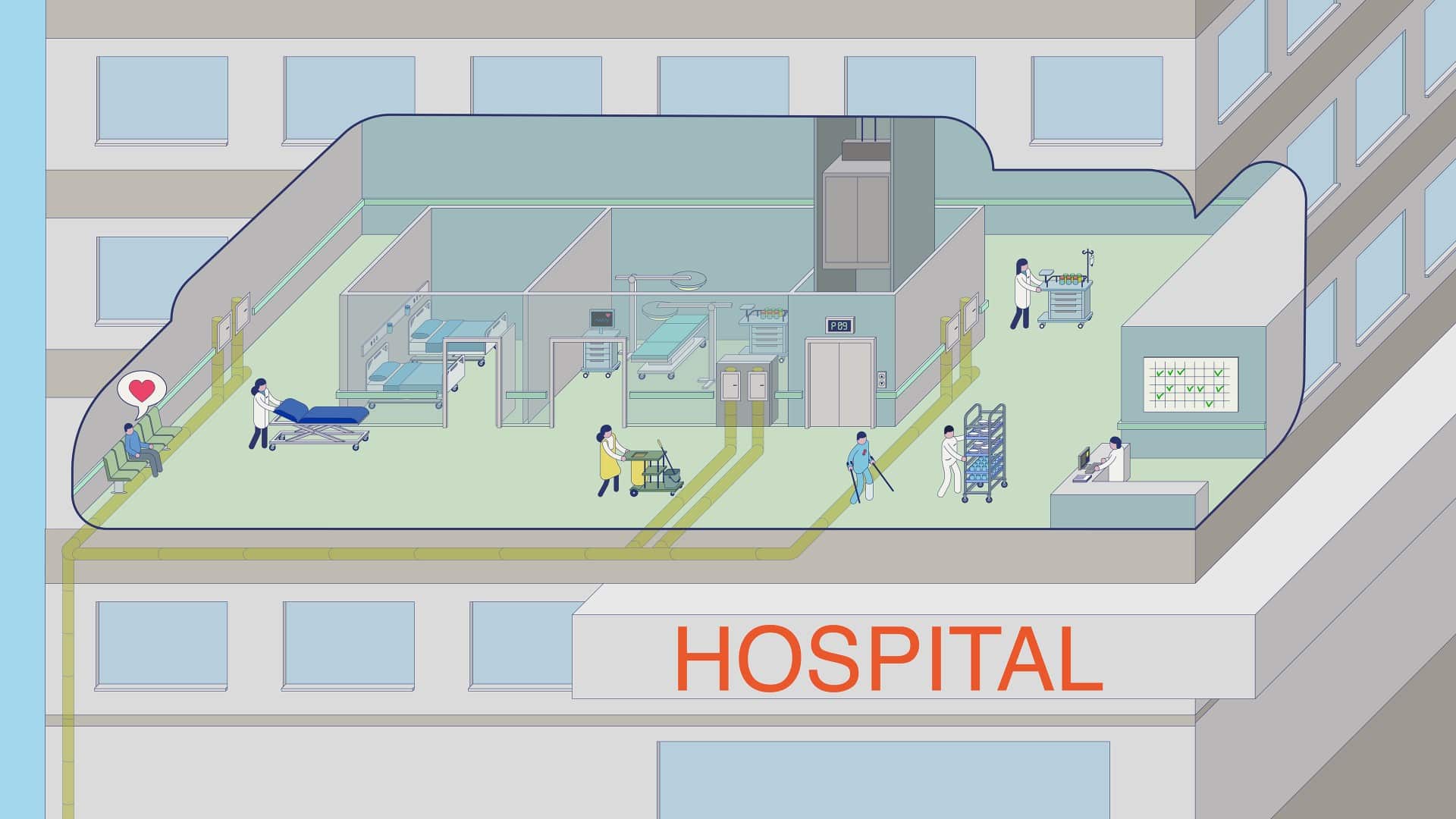
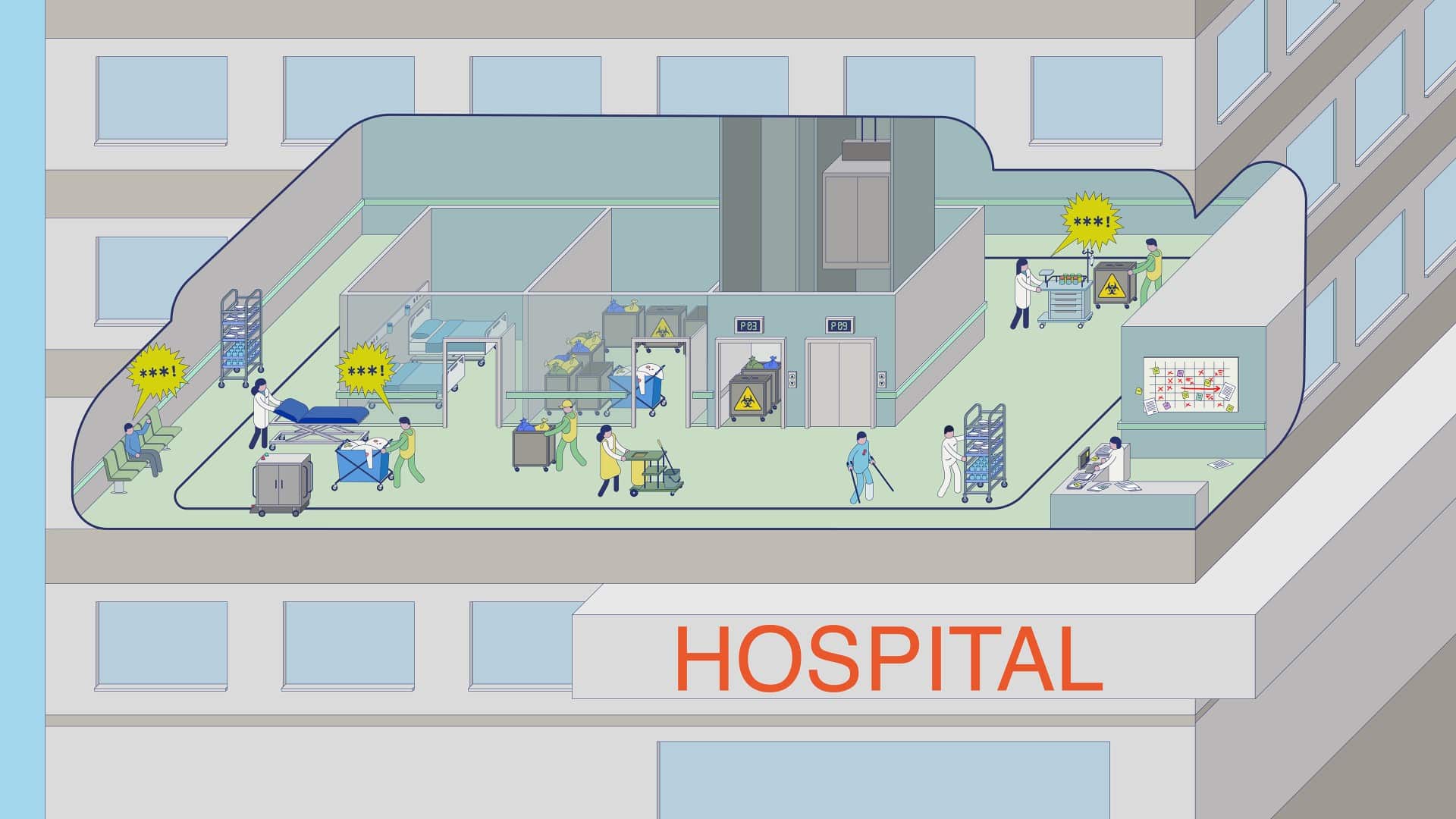
Hospital image
Improved hospital image and reputation.
Hospital image
Poorer hospital image and reputation.
Movement
Safe and efficient movement of staff and patients.
Movement
Difficult movement for staff and patients due to trolleys and agvs in corridors.
Waste storage
No need for local or intermediate waste storage.
Waste storage
Greater need for on-site storage space.
Architectural freedom
Greater architectural freedom and more space for wards and services.
Architectural freedom
Reduced architectural flexibility and usable space.
Lifts
Freed-up elevator capacity and improved logistics.
Lifts
More and larger lifts are required.
Safety
Improved safety: controlled-access doors and a better working environment.
Safety
Lower safety due to increased risks, stressful work conditions, and non-compliance with infection prevention practices.
Cross-contamination
Hygienic, sealed waste transport with no risk of cross-contamination.
Cross-contamination
Higher risk of cross-contamination.
Cleaning
Automated system enables simplified, optimised cleaning routines.
Cleaning
More complex, labour-intensive cleaning routines.
Healthcare waste & associated risks
Urgent need for smart waste collection system


Manual Waste Handling = Hygiene Risk
Exposure increases infection risk for staff and patients

Airports
Airports are complex environments with lots of people moving through them in a limited amount of time. Airports also have a high demand for security and safety. The Envac systems help face the immense logistical challenges of any airport, making waste collection cost-efficient and secure.

Cities
Envac’s automated waste collection system makes urban environments cleaner, healthier, and more sustainable. The smart system reduces air pollution and carbon emissions caused by waste collection traffic, eliminates smell and mess associated with traditional waste collection and makes unsafe and unsanitary waste collection a thing of the past.
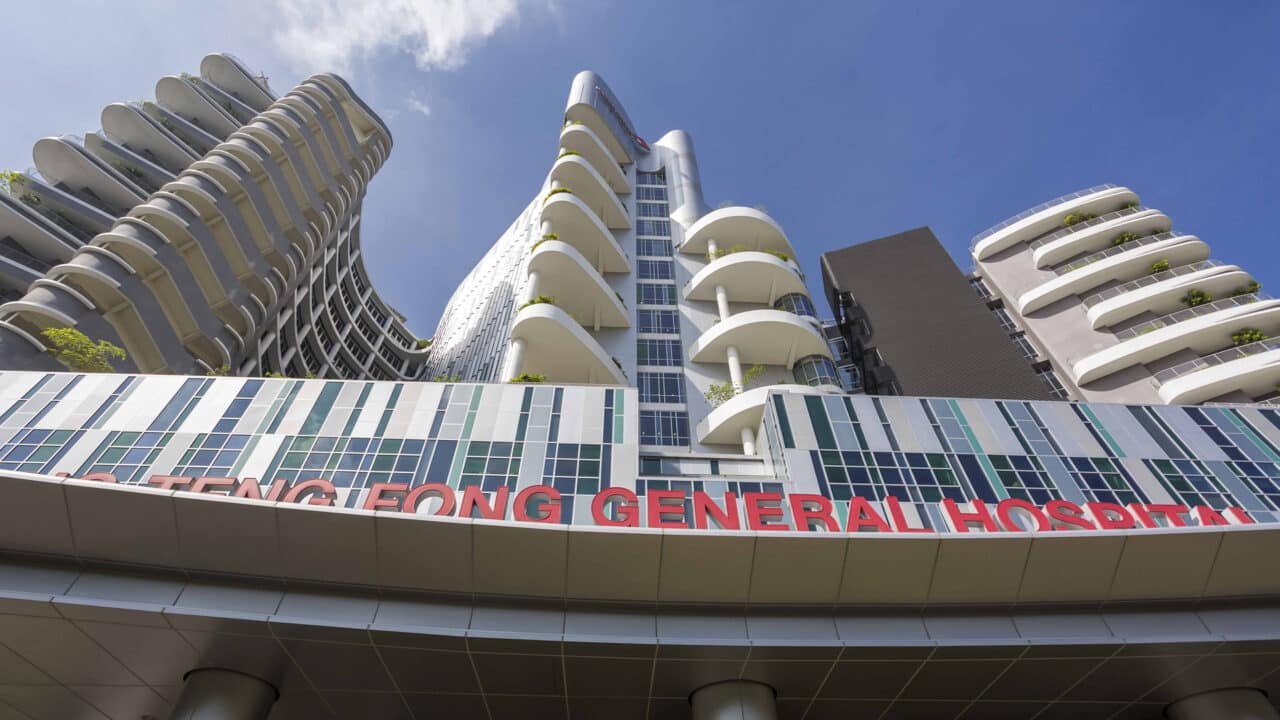
Healthcare
Envac’s automated waste collection system eliminates the need to transport laundry in trolleys or carts outside patient wards, minimising the spread of germs and bacteria while also reducing operational costs.
Solutions for Healthcare
Envac offers a range of automated waste collection systems specifically designed for hospital environments to boost hygiene, safety, and operational efficiency. These solutions can be implemented individually or combined into a comprehensive hospital waste management system.
Stationary Pneumatic Waste Collection System
Traditional waste handling takes up valuable space and risks cross-contamination in the hospital environment. Envac optimises hospital waste management by hygienically
transporting it with a sealed vacuum system to a central collection point. Smart multi-fraction inlets simplify sorting, reduce manual handling, improve hygiene, and save space, labour, and operational costs.
Kitchen Waste Collection System
Envac’s kitchen waste solution eliminates the need for bins and bags by allowing direct disposal of waste into inlets integrated within the food preparation area. The waste is then swiftly transported through vacuum-sealed pipes to a central collection unit, removing transport paths and ensuring a clean, odour-free kitchen that complies with the most stringent hygiene requirements.
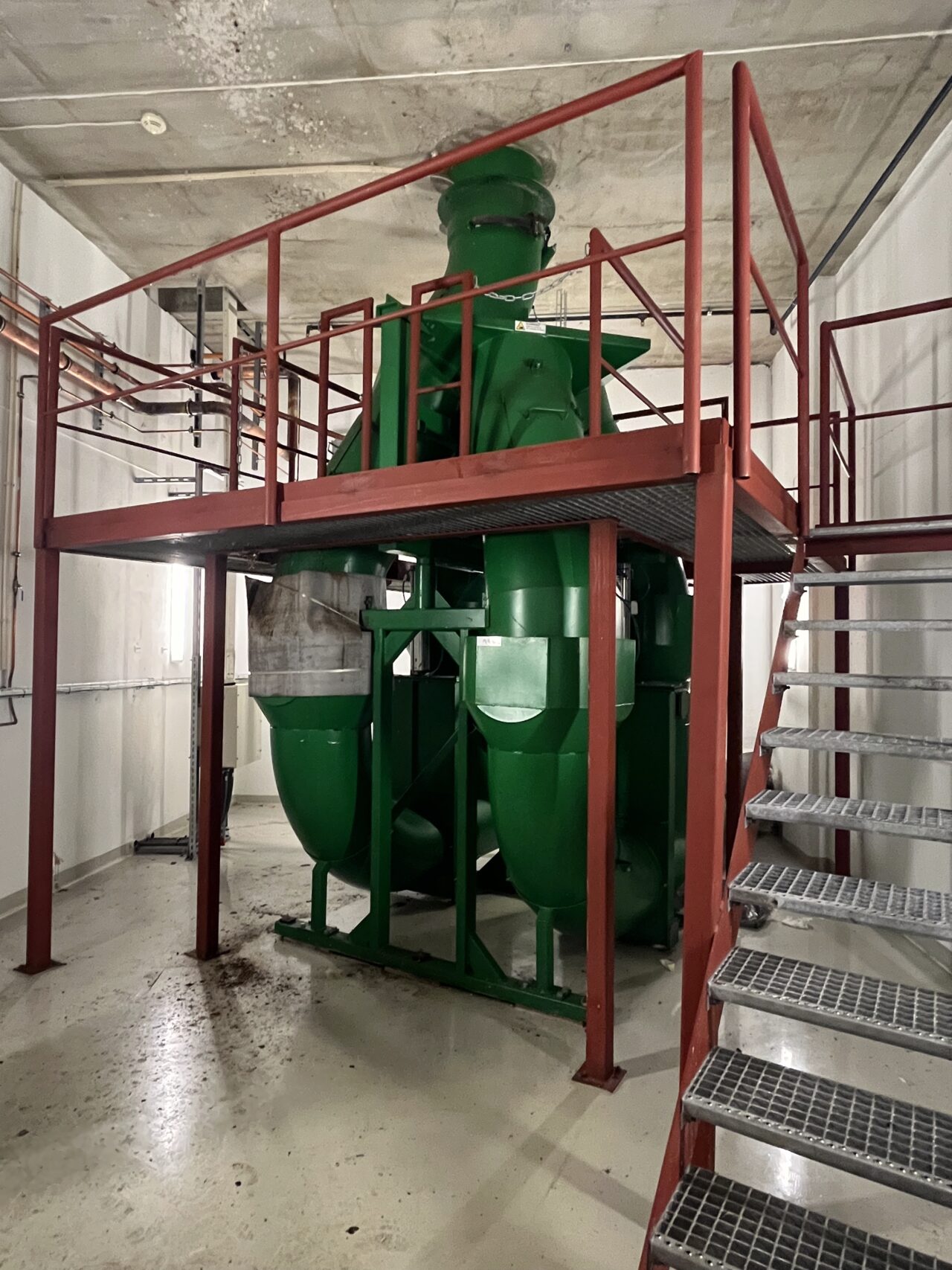
Sort-More
Sort-More, integrated with an automated waste management system, allows hospitals to manage up to four different waste fractions – paper, confidential paper, residual, and plastic through a single chute. Installed at the bottom of a vertical waste chute, Sort-More is a multi-diverter and an intermediate storage unit, seamlessly sorting and storing the various waste streams.
Infectious Waste Collection System
Managing hazardous hospital waste – especially infectious and sharps waste – demands strict routines, special containers, and detailed labelling. Transport must follow strict safety protocols. Envac simplifies this by enabling near-source disposal and enclosed pipe transport to an on-site treatment facility, converting it into non-hazardous waste. The result: safer handling, higher efficiency, full compliance, and lower costs.
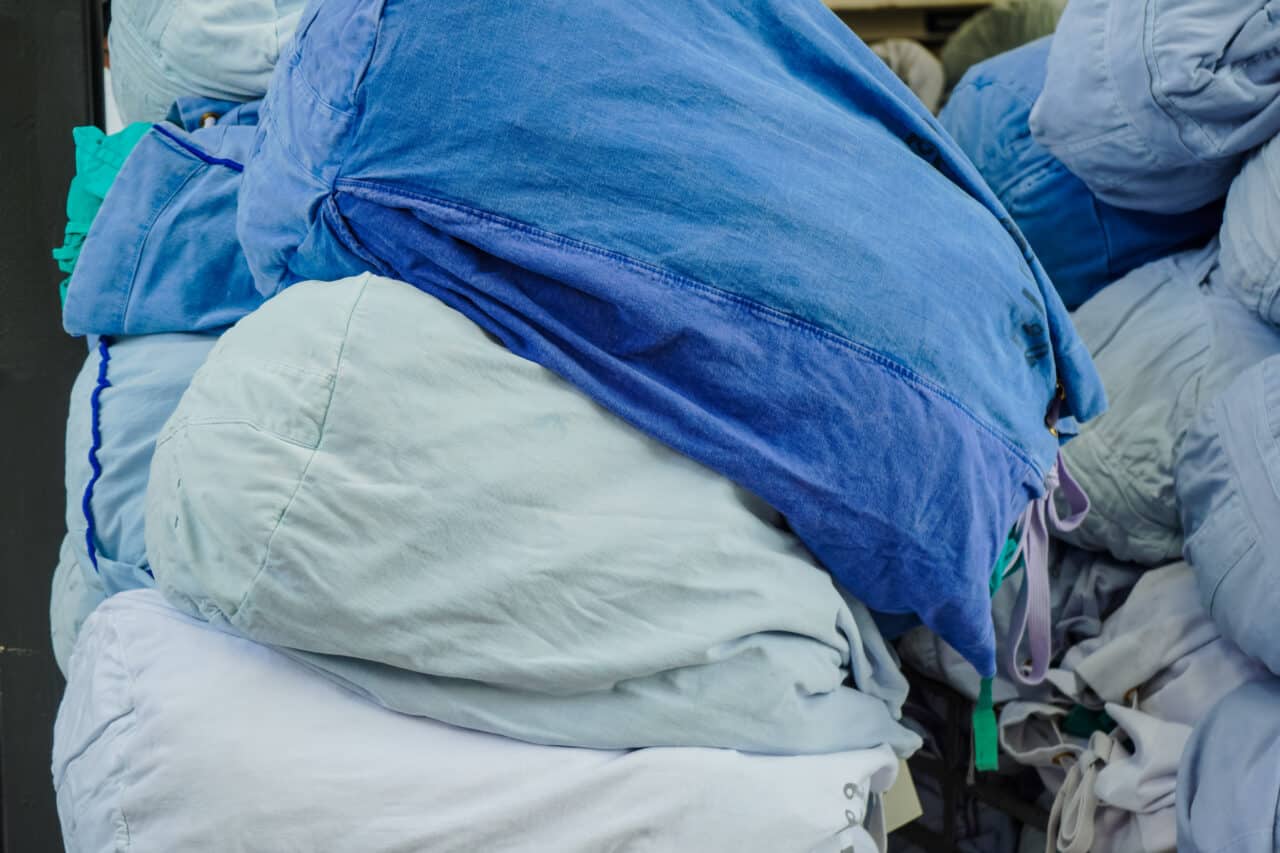
Soiled Linen Collection System
Handling soiled linen risks exposing staff and patients to airborne pathogens, and heavy bags can cause strain-related injuries over time. Frequent transport through corridors and elevators negatively disrupts hospital logistics, decreasing accessibility. Envac’s 24/7 smart linen collection system minimises physical contact, supports infection control protocols, and maintains a clean, efficient, and compliant
environment.
Related Projects
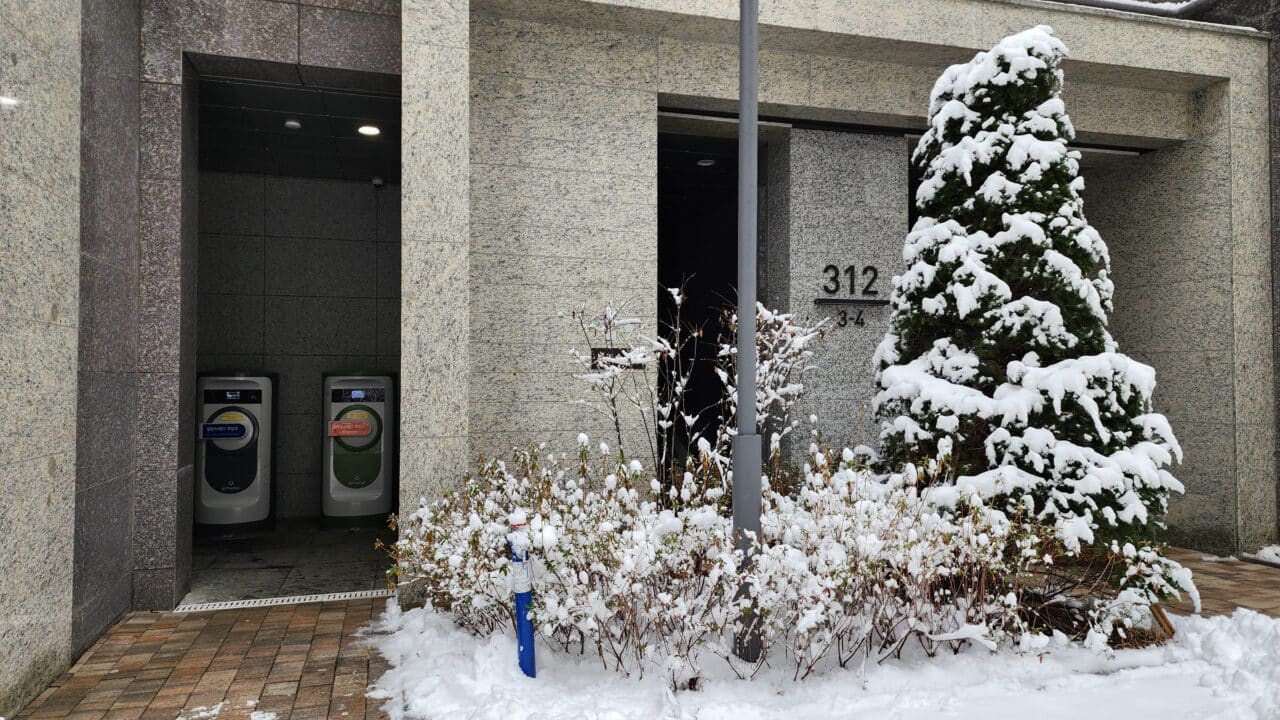
Cities Seoul, South Korea
Heukseok Xi, Seoul
The Heukseok Xi project exemplifies the seamless fusion of luxury living and sustainable urban development. By integrating cutting-edge waste management technology with premium residential features, the complex elevates the everyday lives of its residents and contributes to South Korea’s long-term sustainability goals.

Healthcare Kunshan, China
Kunshan Eastern Medical Center
Envac’s advanced automatic waste collection system at a major hospital in Kunshan, China, significantly improving hygiene and operational efficiency. It includes various departments such as outpatient medical technology, a ward with 2000 beds, a scientific research and teaching office, an infectious disease, and a logistics centre.

Cities Stockholm, Sweden
Hammarby Sjöstad – The Sustainable City
After an environmental programme was drawn up for Hammarby, including rigorous sustainability targets and the most innovative environmental solutions as part of what would later become known as the ‘Hammarby Model’, Envac was appointed to demonstrate the value that pneumatic waste collection add to a contemporary urban environment.

